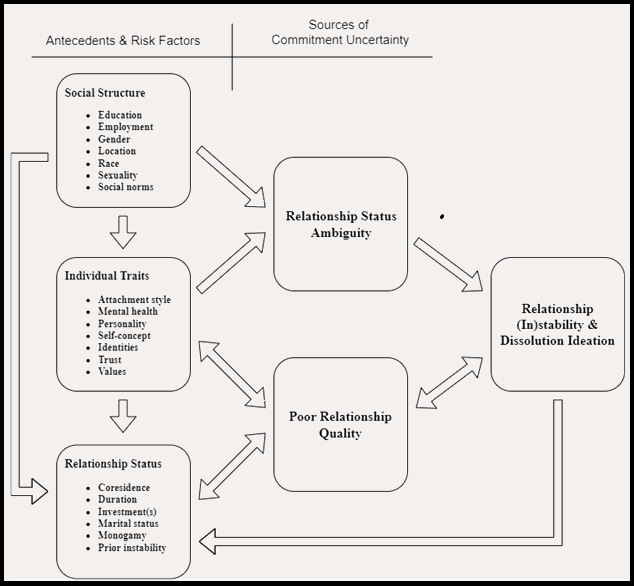Eric Eben Sevareid
Research

Overview:
I am trying to better understand the causes and consequences of problems within and around romantic relationships.Broadly, I am interested in self- and society-level mechanisms on either side of intimate relationship dynamics. From the role of self/identity processes and social structure to health, behavioral, and emotional outcomes.
Specifically, I examine breakups, intimate partner violence, infidelity, verbal conflict, commitment uncertainty, and apprehension towards partners. As a social psychologist, these issues provide highly illustrative loci for examining the behavioral effects of identity processes and emotions.
I also work on measurement and construct validation for various dimensions of romantic relationship experiences (mainly relationship quality, commitment, and uncertainty). Check out my ongoing work (described in the middle column here) as well as my work with MAST on relationship quality and measurement for adolescents and young adults here.
Current projects:
My primary projects span three domains: (1) re-evaluating the scholarship on RQ and commitment in AYA relationships, (2) testing the role of self- and identity-processes in and around relationships, and (3) criminological work connecting relationship processes to violence and drug use. These domains converge at the “dark sides” of romantic dyads in my research.Recent publications:
- “The Relevance of Marriage Plans for Cohabiting Emerging Adults’ Psychological Well-Being: Considering Economic Security and Relationship Quality”
-
“Have Teens’ Cohabitation, Marriage, and
Childbearing Goals Changed Since the Great Recession?” - “Nonverification of the Attractiveness Identity from Adolescent Dating Partners on Mastery, Anxiety, and Apprehension”
1. Main Projects (dissertation):
Currently, my primary work is laid out in my dissertation, in which I propose long-overdue adjustments to the ways family scientists measure relationship quality and commitment in AYA romantic partnerships. Economic and normative shifts in relationship experiences since the mid-century have (1) increased the diversity of young adult relationship experiences and (2) delayed the timing to marriage (ages 28.6 and 20.4 for women and men, respectively; Julian 2022). Relationship science has not caught up with these shifts in terms of our measurement and treatment of the place of commitment in relation to RQ. My work represents a leading attempt to address this. See theoretical model︎︎︎for a quick overview of the theory.

2. Identity Theory and Emotions:
The second major arm of my research activity involves understanding the effects of identity processes for relationship-related outcomes and, conversely, the role of problem relationship experiences for identity outcomes. For example, recently published work of mine examines the stress process and RQ outcomes of nonverification of “attractiveness” self-meanings from adolescents’ romantic partners. I am currently developing a project examining perceptions of sexual non-exclusivity (i.e., cheating) from partners of bisexual young adults and their effects on relationship quality. Learn more at identitytheory.org!
3. Criminology:
I work closely with criminologists (including the 2022 winner of the Stockholm Prize in Criminology, Dr. Peggy Giordano) to evaluate the significance of relationship problems for crime and deviance, especially intimate partner violence and substance (ab)use. My colleagues and I assessed key connections between motherhood, stress, and intimate partner violence. We have also examined adolescents’ dating partners as socializing influences for alcohol use and abuse. I am collaborating with an undergraduate student mentee on childhood risk factors for adult antisocial behavior. We will present this work at the annual conference of the American Society of Criminology in San Francisco, November 2024.
Appointments:
TARS:
I served as data manager for the Toledo Adolescent Relationships Study, and actively work with the TARS team on a variety of projects. The bulk of my research makes use of data from the TARS.
For more information, check out the TARS Series at ICPSR or contact me directly.
NCFMR & MAST:
I also served as a research assistant for the Marriage Strengthening and Research Dissemination (MAST) Center and the National Center for Family & Marriage Research (NCFMR) at BGSU.
You can find a recent example of my work with MAST and the NCFMR on this page under “Overview” or in my links.
The MAST Center is led by Child Trends in partnership with the NCFMR. You can find more about MAST here and view related work in this poster︎︎︎ (click to enlarge).
︎︎︎
